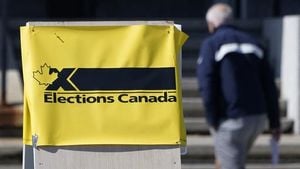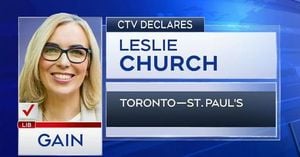Politicians often find themselves at the mercy of humorous narratives, especially when absurdity reigns supreme. Enter J.D. Vance, the Republican vice presidential candidate, who recently became the butt of the joke due to rumors linking him to, of all things, a couch. Tim Walz, the Minnesota governor and Kamala Harris's running mate, cleverly referenced these bizarre claims during his campaign appearances, asserting, “I can’t wait to debate the guy—if he’s willing to get off the couch and show up.” A quip intended to deliver both laughs and barbs, Walz’s comment has sparked discussions about humor, decorum, and the boundaries of political satire.
It all started with social media, where on July 24, one user claimed, “Let’s cut to the chase: J.D. Vance did not mess with a couch.” This absurd rumor, though unfounded, took on a life of its own, amplified by notable figures like Kathy Griffin and John Oliver. The latter mused on why we found it so readily believable—“(a) nobody read (Vance’s book) and (b) it was incredibly easy to believe.”
The couch joke and its ridiculous roots highlight how the political discourse can sometimes slip down the rabbit hole of hearsay. What seemed like harmless fun turned critical when various elected officials jumped aboard the couch gag train, leading to discussions about the broader effects of such narratives. Kamala Harris’s campaign got involved with playful jabs, and the joke transitioned to more serious commentary. For example, they tweeted, “JD Vance does not couch his hatred for women,” illustrating how humor could double as critique.
Yet, as the jokes circulated, some within the media and political circles raised red flags. Renowned journalist Jake Tapper labeled Walz's quip as “a gross smear.” Such criticisms led to counterarguments by those defending the cheeky banter, asserting it was all part of the fun, pushing back against the “lighten up” mentality prevalent within some quarters.
The juxtaposition of humor and political strategy raises questions: should lawmakers engage with satirical rhetoric? Many Democrats still feel the ghost of their 2016 campaign, distinctly haunted by the mantra of “when they go low, we go high.” After years of Trump's verbose narratives and conspiracy-laden rhetoric, can Democrats afford to play by the same rules? Or should they stick to higher ground, striving for dignity even amid the absurd?
Critics argue it’s not suitable for Democrats to stoop to such tactics, even jokingly. The sentiment is echoed by figures who stress the importance of factual narratives over fabricated absurdities. For example, O'Reilly suggested Walz committed “defamation,” indicating he should have known better than to perpetuate such unfounded discourse.
The couch joke, and the uproar surrounding it, isn’t just amusing chitchat; it peels back layers of the political climate. A notable factor is Vance’s reaction. He refuted the claims about himself, stating, “This is just a narrative crafted by social media interns who were maybe bullied.” He claimed Democrats are entrapped within this bubble of absurdity, where they feel free to launch baseless attacks from the comfort of their digital spaces.
Despite initial lightheartedness, this saga speaks to the crux of political strategy. Vance attempted to paint his opponents with the brush of absurdity to counteract any criticisms. He argued against what he perceived as their penchant for sensationalist narratives, pulling the discourse direction back to more serious criticisms of policy, governance, and authenticity.
While many found it now hard to view the couch joke as innocuous fun, it reveals the fine line politicians must navigate. Can humor aid those aiming to dismantle narratives against them? Or does it risk losing credibility? Harris’s team navigated this dynamic by being sharply aware of when humor serves as useful critique, as opposed to simply feeding the beast of misinformation.
The broader political environment remains intertwined with memes and narratives, where information spreads like wildfire, often detached from its truth. A shift has been noted; as previously responsible sources adopt more absurd postures, critics question how this will affect their integrity come November. Can these playful narratives provide voters with clarity on policies, or do they just serve to distract from substantive issues?
Walz’s couch reference is not the only jest on the campaign trail attracting attention; countless instances across factions have perpetuated this comedic tradition. Still, one has to wonder whether slinging gags will bear ripe reward, or if it will plunge back to haunt the lawmakers spinning the yarn. Time will tell how this jest will ripple throughout the 2024 political arena as candidates shape their battle strategies leading to November’s elections.
Balancing serious discourse with lighthearted humor may be the challenge of the season for many Democrats. While the couch story brings laughter today, it digs complicated trenches for discussions about election integrity and credibility. After all, voters often seek authenticity, and it might well be moronic, yet humorous narratives could overshadow their genuine attempts to communicate. The next months will clarify whether offense leads to appeal or if the wounds of ridicule become more palpable than their political capital.
Whether humorous jests and stark realities converge with strategic insight remains to be seen. This golden age of social media can yield creative outreach or drown legitimate issues beneath the escalating chaos of jokes gone too far. No longer can one afford to traverse the political domain without also assessing how narratives—be they funny or fatal—could just as easily sway the collective opinion. Thus, the novel tactic of couch-related banter might not be so easily dismissed as flavor of the week.
Though the political climate revolves around this quirky anecdote, the important takeaway is clarity versus chaos. Walz’s words might be sharp, but will they serve insight or merely draw ire? The impending verdict rests upon voters—who will judge if they’re playing the political game or merely the fool. The electoral ballot may soon reflect not just preferences but the temperature of the debate circling ridiculousness and its place alongside authenticity. Will they take jabs, laugh at inaccuracies, or demand integrity from their political representatives? That remains to be seen, proving again; politics is not merely about who can tell the best jokes, but who can tell the best truths, albeit wrapped snugly within laughter.



